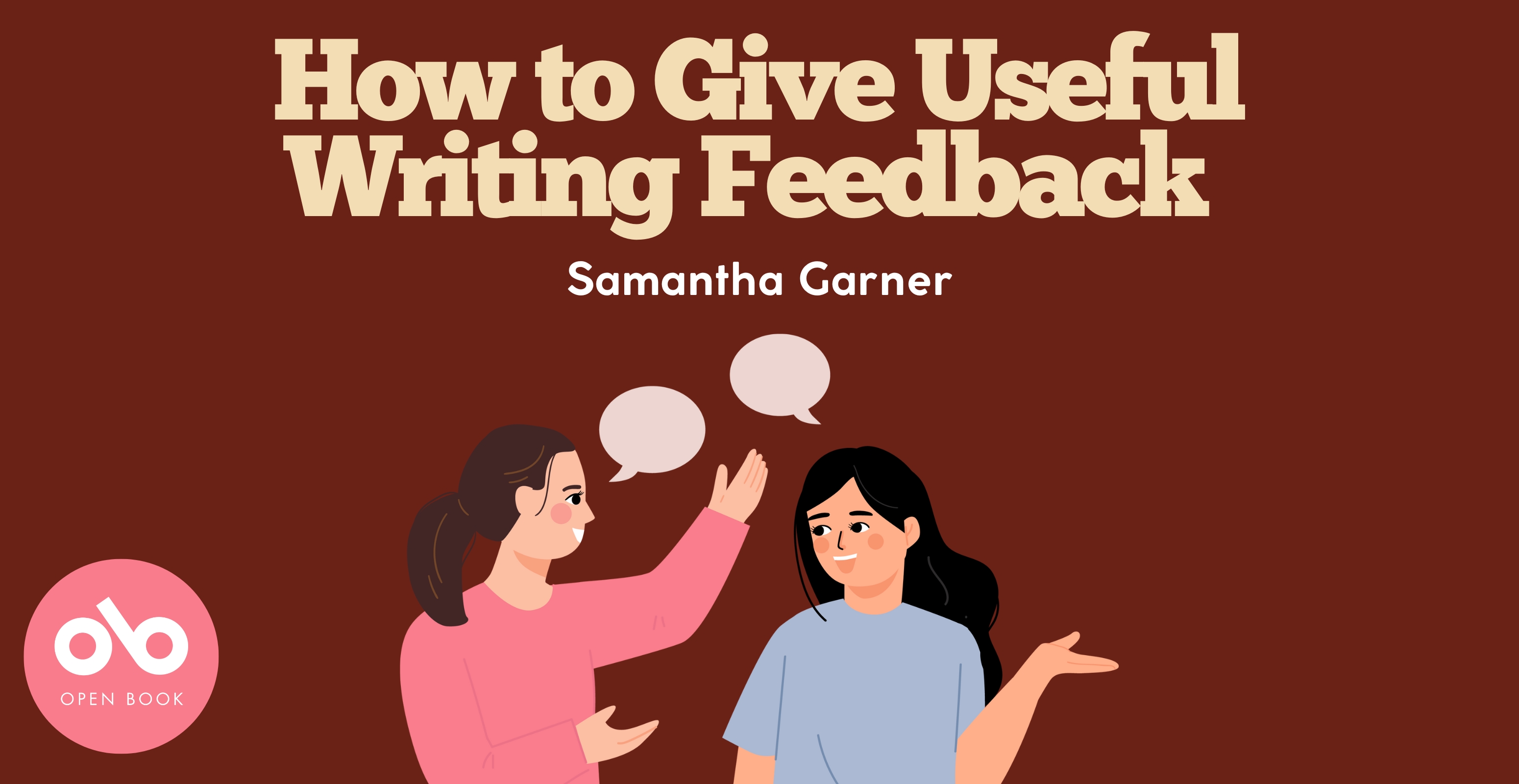How to Give Useful Writing Feedback
By Samantha Garner
Many writers have friends who are also writers, and sometimes those friends ask us to give feedback on their work. Yay! We get to help our friends succeed! However, there can also be anxiety behind it. We’re supposed to be objective but also respectful of the work—and the writer behind it. So what do we do?
Here are some tips to keep in mind about giving constructive writing feedback.
How to give useful writing feedback
One thing that used to overwhelm me about the concept of giving feedback to other writers is that I didn’t know what they were looking for. Did they want a high-level overview of the plot, an in-depth analysis of character interactions, a review of general comments on the vibe and atmosphere, or something else? Something I learned pretty quickly is that it’s rare for a writer to want feedback on everything under the sun. By the time they’re at the feedback stage, they usually have a pretty good idea about what they need a second opinion about. So don’t feel weird about asking about their intent for the project, what specific things they want feedback on, and in what order of priority.
No matter the length of the piece I’m giving feedback on, I find it helpful to write down notes as I read, sorted into the abovementioned priority categories the writer wants me to pay attention to. I may or may not present all of these notes to the writer, depending on how things shake out by the end. Sometimes a question is answered later or ends up not being something I feel that the writer needs to know.
This brings me to another important aspect of giving writing feedback: learning to understand what’s my own preference and what’s in the best interest of the work I’m reading. I’m sure we’ve all read a book that we understood was good, but not necessarily written the way we’d write it. We usually finish reading, appreciate the book for what it is, and move on. But when giving writing feedback, these small points of difference can feel like something we need to address with the writer. After all, they’ve specifically asked us to, right?
Well, it depends. This is why it’s important to ask the writer beforehand what their goals are for the feedback and for the project. Maybe you don’t love the poetic, experimental dream sequences scattered throughout the book, but maybe the writer’s using them to uncover key plot points. In a case like this, ask yourself why you don’t love it. Is it just not your style? Or are you honestly confused about whose point of view it is? If it’s something critical to the work as a whole, sure, bring it up with the writer.
Exactly how to frame feedback is another thing people worry about getting wrong. Critique doesn’t have to mean critical, though. For example, if you’ve decided that the experimental dream sequences really are just confusing to follow, you don’t have to say it in that blunt, closed way. Instead, give the writer valuable information they can use. You can say something like, “I found it difficult to understand whose point of view the dream sequences were, because they referenced events that the main character couldn’t have known about. Was there something I overlooked?” Then, the writer can more easily pinpoint something they may want to review. Maybe they could have done a better job with the POV, maybe they could strengthen something earlier to make those references more clear, or maybe they simply forgot to remove something from an earlier draft (happens to the best of us, I’m afraid).
And don’t think that simply asking questions doesn’t count! You can’t be expected to know the way to “fix” certain issues with a project, and sometimes that’s not what the writer needs. Asking clarifying questions about the way certain elements support the story can help the writer decide later whether those elements help or hinder.
In any case, remember to keep an open mind, focus on the needs of the project, and questions that generate discussion. Oh, and please do tell the writer what you liked and why. Receiving feedback is a highly vulnerable thing, but when a writer understands why certain things work, it’s a helpful anchor for their project overall.
Your CanLit News
Subscribe to Open Book’s newsletter to get local book events, literary content, writing tips, and more in your inbox
In my next column I’ll examine the other side of this coin: how to receive useful writing feedback as an author.
The views expressed by Open Book columnists are those held by the authors and do not necessarily reflect the views of Open Book.
Samantha Garner is the author of The Quiet is Loud, shortlisted for the 2022 Kobo Emerging Writer Prize. A Canadian of mixed Filipino-Finnish background, her character-driven fantasy novels explore themes of identity and belonging. When not writing, Samantha can be found daydreaming in a video game or boring a loved one with the latest historical fact she’s learned.
She can be found online at samanthagarner.ca and on Instagram and Twitter at @samanthakgarner.




